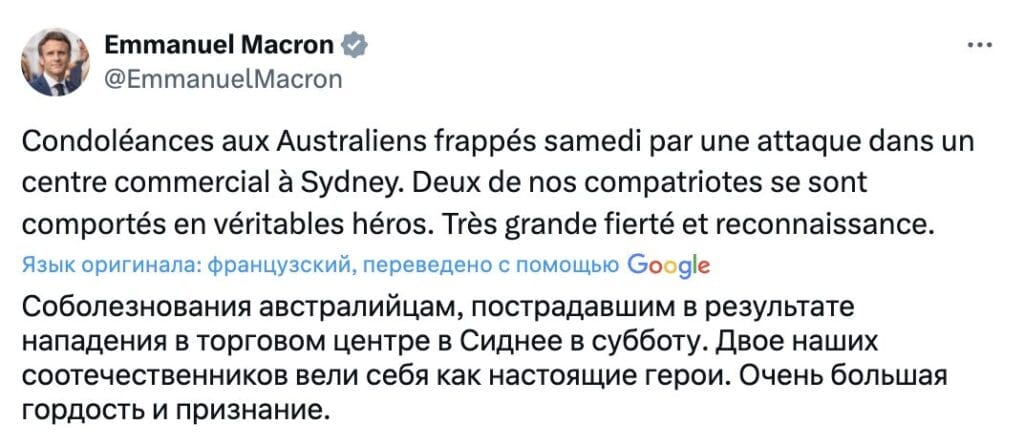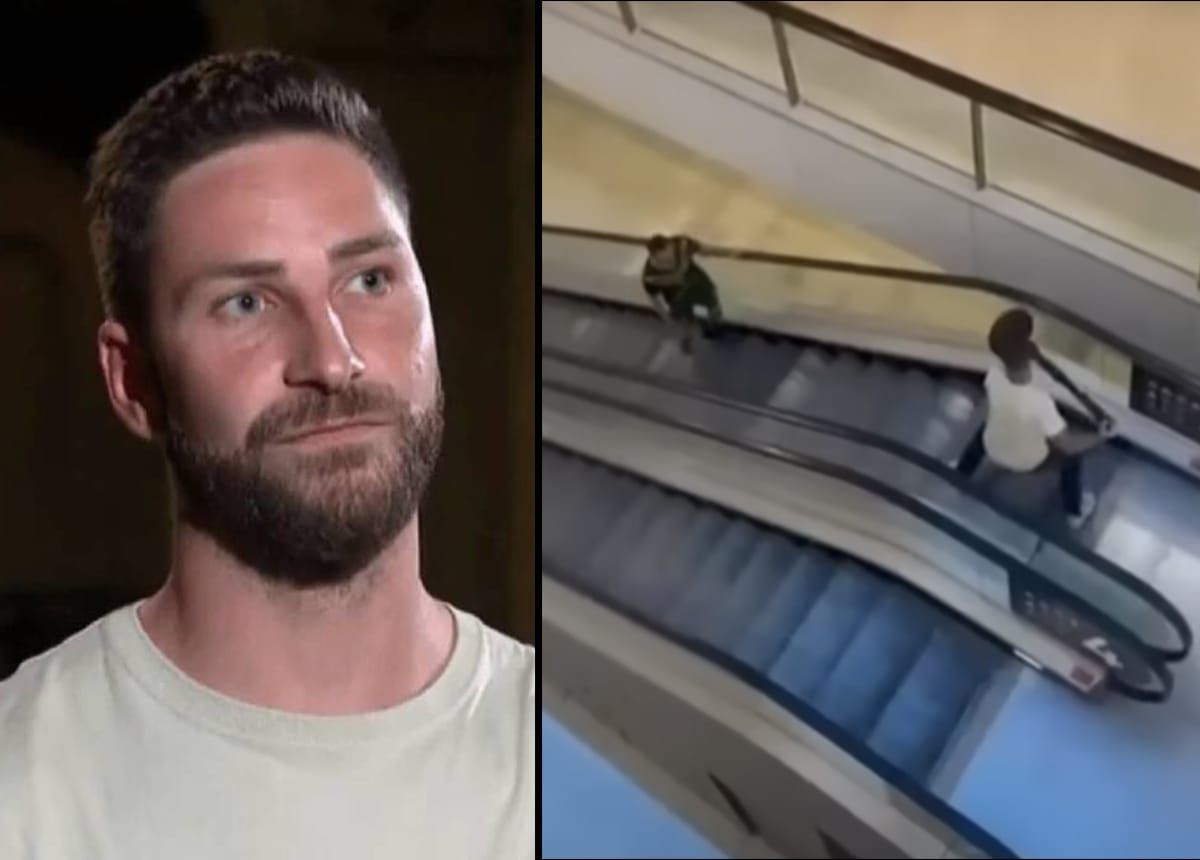In April 2024, reports circulated on the Internet that a man who fought back a criminal who attacked mall visitors in an Australian city with a knife turned out to be a citizen of the Russian Federation. We decided to check if this is true.
On April 13, 2024, a criminal armed with a knife attacked on shoppers at a shopping center in Sydney, killing six people and injuring at least eight others. He was later shot dead by a police officer while trying to resist arrest. The reasons that prompted the man to commit an armed attack are still unknown. Notedthat all the dead, except for the shopping center security guard, were women. According to the criminal's parents, he suffered from a mental disorder and refused to take medication.
The feat of the alleged Russian, who is now allegedly wanted by all of Australia to reward him for heroism, was reported on the same day by many Russian media (“Russian newspaper", "RIA Novosti», "Gazeta.ru", "Arguments and facts", Life, "Constantinople", RT etc.). Social media users also discussed this news (“VKontakte", "Classmates") And blogging platforms. However, the next day some publications (for example, RBC) with reference to the Russian embassy in Australia, they reported that the man who protected visitors to the shopping center from the criminal turned out to be Ukrainian. On this right away reacted pro-Russian bloggers on Telegram, markwho said that “in a criticalthe moment the little crest suddenly turns out to be Russian» and switches to Russian.
Apparently, the basis for publications about how a Russian fought back an attacker at a shopping center in Sydney is a four-second video filmed during the attack. The video, which has gone viral, shows how a man, armed with a barrier post, does not allow the criminal to go up the escalator. This shopping center visitor became widely known on the Internet as bollard man, that is, “a man with a column.” At the very end of the short video, the man shouts what appears to be the Russian phrase “Don’t come closer!”
Since the man’s act gained great resonance, journalists established his identity - and he had already managed to give interview Australian media, which was published on April 15. The hero turned out to be neither Russian nor Ukrainian, but a Frenchman named Damien Gero. On April 13, he and his friend Silas Depreo went to the shopping center and witnessed the attack. The men immediately armed themselves with fence posts and tried to stop the criminal. Depreo was not included in the video, so he did not become so widely known. It is reported that Gero was in Australia on a temporary visa, which expires in July, but on April 16, the country's Prime Minister Anthony Albanese statedthat the government will consider extending this document, and in the future, granting the Frenchman Australian citizenship.
On the same day, the French Ambassador to Australia Pierre-André Imbert wrote on their X page: “Two of our compatriots showed great courage in trying to stop the attacker. I thanked them on behalf of France and we will soon have the opportunity to express our collective gratitude to them.” Later to him joined and French President Emmanuel Macron, adding: “Two of our compatriots behaved like true heroes. Very proud and recognized."

“Verified” could not find information that Gero has Russian or Ukrainian citizenship, Russian or Ukrainian roots, or has even ever been to Russia or Ukraine.
Many Russian Media, who spoke about the Russian origin of the “man with a column”, referred to reports from the Australian television channel 7News, but “Verified” could not find such information on its website. Perhaps the correspondent who broadcast live from the scene in the first minutes after the incident actually said something similar, relying, for example, on that same four-second video, but the channel, apparently, did not report this later.
As for the phrase spoken by Gero to the attacker and taken by many (obviously mistakenly) for the Russian-language “Don’t come!”, the fragmentary nature of the recording and its low quality do not allow us to reliably establish what exactly he shouted. It may have been the French colloquial phrase "viens pas ici", which can be literally translated as "don't come here".
The phenomenon when a person misheard or interpreted a phrase, giving it a new meaning based on consonance, is called Mondegrin, or misheard. That is, in this case, Russian-speaking viewers who do not know French could “hear” a Russian-language phrase with a suitable meaning. The same fate befell, for example, the song from the Soviet film “D’Artagnan and the Three Musketeers”, where in the predominantly Russian-language text some words from French are found - Internet users they tell, that in the song of the same name they hear something other than French “Pourquoi pas?”, and “half a bug”, “doll-fa” and other expressions familiar to them. Mishearing can also occur within one language: for example, some admitthat in childhood it seemed to them that Alla Pugacheva was in the song “Harlequin” he sings not “There is one reward - laughter,” but “There is one leg for all.”
Thus, there is no reason to believe that Damien Gero, who fought back an attacker on shopping center visitors in Sydney, has any connection with Russia or Ukraine. In a short video that went viral online shortly after the attack, Gero can be heard shouting what sounds like “Stay back!”, but there is no other evidence to support the media coverage. Judging by the interviews that Australian journalists took with the “man with the column,” there is no reason to doubt that he is a French citizen.
Cover photo: screenshots from YouTube channel video 7News Australia
Read on the topic:
- ABC News. Damien Guerot, who fought off Bondi Junction attacker with bollard, to be granted permanent residency, lawyer says
- Is it true that the video of the Hamas attack on Israel contains orders in Russian?
- Did the Swedish Prime Minister say that Israel has the right to commit genocide?
If you find a spelling or grammatical error, please let us know by highlighting the error text and clicking Ctrl+Enter.






